- BIOINFRA Life Science
- SONOSKIN
The multi-biomarker blood test is an innovative cancer testing technology, which was acquired through BIOINFRA Life Science’s long history and efforts in research and development.
The multi-biomarker blood test involves analyzing the risk for 8 major cancers (lung cancer, liver cancer,stomach cancer, colorectal cancer, prostate cancer, and breast cancer). By precisely measuring the peptidebiomarkers inside the blood and analyzing the data via big data statistics, the technology predicts the cancerrisk for individuals with high detectability rates.
Technological Principles
It identifies cancer risks by comparing the biomarker values acquired by separating peptide from a smallamount of blood, with big data analysis numbers from more than 5,000 cases of normal and cancer-diagnosed samples.
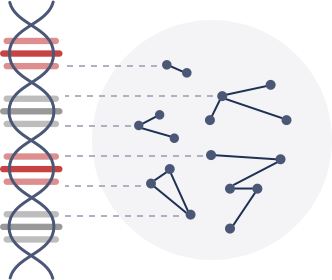
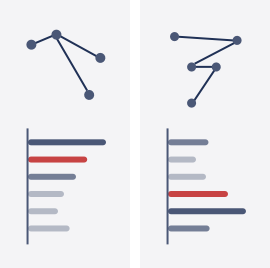
Biomarker
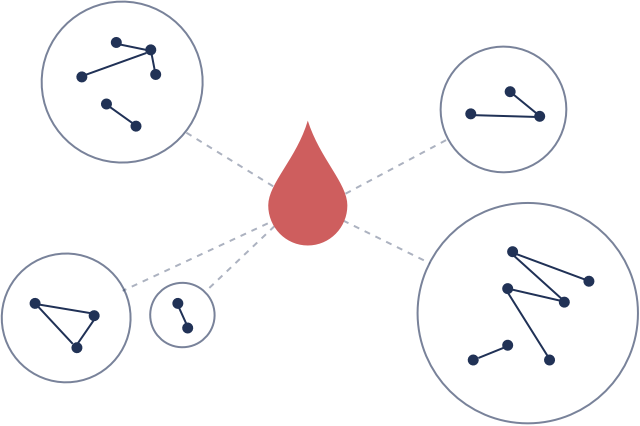
To check someone’s health condition, we need an index with verifiable numbers. In medical terms, this index is called a ‘biomarker’ and BIOINFRA Life Science’s multi-biomarker blood test technology uses ‘peptide’ as a biomarker for analysis.
There exists an infinite number of micro-peptides inside the blood of our bodies. These are very important ‘biomarkers’ that reveal the status of our health because the number of these micro-peptides constantly changes depending on genetic factors and life patterns.
Process
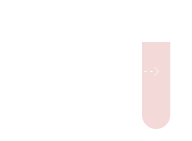
Blood Extraction
Extract a small amount of blood.
Peptide Biomarker Analysis
Conduct a precision analysis on the multiple peptide biomarkers inside the blood.

Big Data Statistical Analysis
Analyze the results of precision analysis with BIOINFRA Life Science’s unique big data statistics.

Cancer Risk Calculation
Calculate the risk of each cancer through big data statistical analysis.
Development Range
The multi-biomarker blood test was researched and developed for the 8 major cancers(lung cancer, liver cancer, stomach cancer, colorectal cancer, prostate cancer, breast cancer, pancreatic cancer, and ovarian cancer),and we are continuing our research for other cancers as well.
Cancer
Cancer
Cancer
Cancer
Cancer
Cancer
Cancer
Cancer
Specificity & Sensitivity
Multi-Biomarker Blood Test maintains a high level of specificity while returning more accurate testresults with a far greater level of sensitivity compared to existing blood tests.
Cancer
Cancer
Cancer
Cancer
Cancer
Cancer
Cancer
Cancer
The multi-biomarker blood test possesses more than20 patents from inside and outside the country,including the new health technology certificationby the Ministry of Health and Welfare.
 Korea
Korea
- A kit for the diagnosis of lung cancer, which uses a complex biomarker2013-0052508
- A method to predict a reactivity for the treatment of lung cancer regarding EGFR target treatment medicine2013-0060659
- How to use ANT2mRNA inside an exosome for the diagnosis of breast cancer2011-0085047
- A method to create the information of cancer diagnosis utilizing a complex biomarker, and a system device to predict cancer diagnosis2010-0139567
- Pharmaceutical composition to induce apoptosis including the green fluorescent protein, the fusion protein of BfI-1 or genes that code them.2004-0034598
- Peptide biomarker for stomach cancer diagnosis and diagnosis kits utilizing them2006-0019517
- Peptide biomarker for colorectal cancer diagnosis and screening, and the measuring method of the aforementioned marker to diagnose colorectal cancer2008-0046642
- Methods of cancer diagnosis and screening through measuring concentration in serum of Des-R prothrombin activation peptide fragment F22008-0023803
- A method to compose a complex biomarker for the diagnosis of lung cancer and a complex biomarker for the diagnosis of lung cancer2010-0139568
- Conjugate of T/Tn and oxidized mannan and cancer vaccine composition including the conjugate2003-0023276
 U.S.
U.S.
- Protein markers for diagnosing stomach cancer and the diagnostic kit using them12/281,086
- Method for treating breast cancer using adenine nucleotide translocator 2 (ANT2) siRNA or ANT2 shRNA13/030,860
- Method for monitoring, diagnosing, and screening cancer through measuring the concentration of Des-R prothrombin activation peptide fragment F2(Des-R F2) in a serum12/993,198
 Europe
Europe
- Method For Monitoring, Diagnosing, And Screening Cancer Through Measuring The Concentration Of Des-R Prothrombin Activation Peptide Fragment F2 (Des-R F2) In A Serum 2009720089
 China
China
- Method for treating breast cancer by decreasing the expression of adenine nucleotide translocator 2 mRNA201180067534